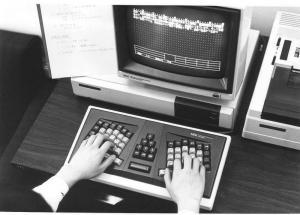The Impact of the Digital on Japanese Studies
PUBLISHED ON NOVEMBER 14, 2016
The Center for East Asian Studies completed the “The Impact of the Digital on Japanese Studies” workshop on November 12th. The second and final day of the event included speakers from the University of California, Berkeley, the National Institute for Japanese Language and Linguistics, and two University of Chicago faculty. These speakers tackled topics such as data collection, the conversion of print materials into digital resources, and the recording of non-traditional digital materials such as Twitter novels and self-published books.
Additionally, the discussion session following the formal presentations allowed the scholars to discuss and debate (in both English and Japanese) the nuances of digitalization in Japanese studies. University of Chicago’s Associate Professor of Japanese Literature Hoyt Long described one of these issues as a “bottleneck of digitalization” and expressed frustration concerning the reduced speed and efficiency regarding digitalization in the face of linguistic barriers.
One issue the workshop was able to overcome was reduced information visibility as the participating scholars offered aid, research, and contacts to each other following each presentation. Associate Professor of History at the University of Chicago Susan Burns shared her own population density maps of early 20th century Tokyo (initially created to study the placement of hospitals and leprosy treatment centers) to other scholars studying the time period.
The event concluded with a discussion led by Professor Long and the decision to create a mutual database for the participants to share information and raw research. Long received support from the University of Chicago’s East Asian Collections library staff, who suggested collaboration between university faculty and library staff to gain access to Japanese copyrighted and otherwise inaccessible material.
Contributed by Grace Bologna
The Impact of the Digital on Japanese Studies
November 11-12, 2016
Joseph Regenstein Library, Room 122
1100 E 57th St, Chicago, IL 60637
The University of Chicago hosted a public workshop on “The Impact of the Digital on Japanese Studies” on November 11-12, 2016. The goal of the workshop was to bring together a variety of Japan scholars to consider how digital data and computational methods are changing the ways we organize and analyze cultural and historical information. It was also meant to catalyze new initiatives and projects by bringing together experienced and newer voices to brainstorm, discuss, and offer critical feedback on digitally inflected work and how it might support humanistic scholarship.
The workshop was organized around projects at various stages of completion, ranging from those at a conceptual stage to those more fully realized. Presenters shared the results of any data-driven work they have done while addressing the technical or methodological processes involved in this work and possible future directions for research. Subject matter ranged widely across multiple time periods and disciplines and interrogated some of the most popular computational methods: text analysis, network analysis, and spatial analysis.
Workshop Sessions
Session 1
Hyakunin Isshu as a Mini Database
Catherine Ryu, Michigan State University
On Structure and Style in the Dai Nihon Shi
Aliz Horvath, University of Chicago
On Late Medieval Forgery Production
Paula R. Curtis, University of Michigan
Session 2
The Epigraphy of Business Documents
Raja Adal, University of Pittsburgh
On the Politics of Text
Amy Catalinac, New York University
On the Language of Empire in Taiyo Magazine (1895-1925)
Molly Des Jardin, University of Pennsylvania
Political Discourse in Early Meiji Japan
Mark Ravina, Emory University
Session 3
Mapping Medical Edo/Tokyo
Susan Burns, University of Chicago
Can You Sing a Map?
Joel Legassie, University of Victoria
On Scale
Jonathan Zwicker, University of California, Berkeley
Session 4
On Collecting Data
Jonathan Abel, Penn State University
On Aozora Bunko as Archive
Hoyt Long, University of Chicago
On Japanese Corpora and Tokenization
Toshinobu Ogiso, National Institute for Japanese Language and Linguistics
 THE UNIVERSITY OF CHICAGO
THE UNIVERSITY OF CHICAGO


